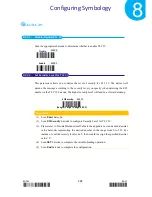
Enter 269 End
*/$%ENTR* *ZEND*
Configuring Symbology
8
8-26-4.
Set Code ID for Plessey
A user-defined Code ID functions as an identity for a specific barcode type to be
differentiated from others. It is especially helpful while you are dealing with more than
one type of barcodes at the same time. Scan the barcode below to customize your own
Code ID for Plessey.
Procedure
(1)
Scan
Enter
barcode.
(2)
Scan
UDSI
barcode to tailor Code ID for Plessey to your needs, if necessary.
(3)
Please refer to ASCII Code Table and Decimal/Hexadecimal Table in the
appendix to scan hexadecimal value barcodes representing the desired string
which has to be at most 2 characters in length. For instance, to set its Code ID to
be “Py”, scan
5, 0, 7,
and then
9
to assign the specified hexadecimal value
“5079”.
(4)
Scan
SET
barcode to complete the variable-binding operation.
(5)
Scan
End
barcode to complete the configuration.
8-26-5.
Set Length Scale
Length scale variables have to work collaboratively with length qualification which is
illustrated in Section 8-26-3. For the reason, three length variables are available for you to
further associate with the desired values. Depending on the type of qualification you select,
length variables can have different meanings. With
Min
length condition,
PlesseyLen1
variable represents the minimum size to limit the minimum length of a valid barcode. On the
other hand, with
Min/Max
length condition, the barcode will be decoded only if its length
has to fall within the range of
PlesseyLen1
to
PlesseyLen2
.
In this case,
PlesseyLen1
stands
for the minimum and
PlesseyLen2
for the maximum. However,
PlesseyLen1, PlesseyLen2,
and
PlesseyLen3
can also represent a group of length limits when
Fixed
length qualification
is chosen. It means the scanner will only decode the barcode with the length which agrees
with
PlesseyLen1, PlesseyLen2, or PlesseyLen3.
*47C02*
UDSI
47C02
*47532*
Min/Max
47532
(Length: 2 digits)
















































